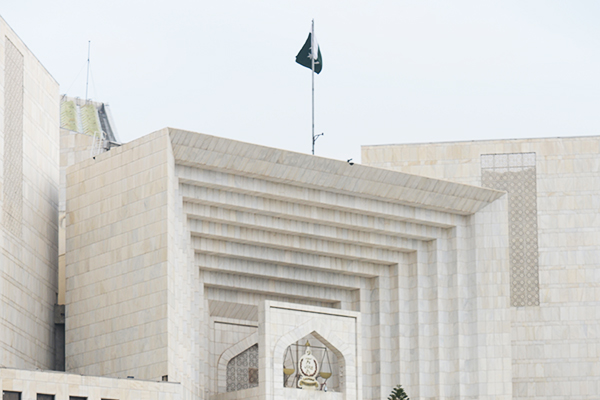
Farooq Naeem—AFP
The Supreme Court of Pakistan on Tuesday ruled that votes cast by lawmakers against the instructions of their parliamentary party cannot be counted and must be disregarded.
The split decision saw three judges—Chief Justice of Pakistan Umar Ata Bandial, Justice Ijazul Ahsan, Justic Munib Akhtar—maintain that dissident lawmakers’ votes could not be counted in Parliament. However, Justice Jamal Mandokhail and Justice Mazhar Alam Khan Miankhel said they did not agree with the majority decision and would record their reasons for the same in the detailed judgment to be issued at a later date.
The court’s verdict was issued on a presidential reference seeking its interpretation of Article 63(A) of the Constitution. Article 63(A) outlines grounds for disqualification of a sitting parliamentarian if they have acted in violation of party discipline.
The presidential reference had raised four questions for the opinion of the Supreme Court: can defected parliamentarians be allowed to cast their votes; if a lawmaker has defected, is their vote given equal value as that of a non-dissident; can defected lawmakers be disqualified for life; what other measures can be taken by the government to curb the buying and selling of votes.
Detailing its response, the majority judgment said that Article 63A could not be read and applied in isolation, “and in a manner as though it is aloof from, or indifferent to, whatever else is provided in the Constitution.” It said that Article 63A must be read with Article 17(2), which refers to freedom of association. “In its essence Article 63A functions to protect, and ensure the continued coherence of, political parties in the legislative arena where they are the primary actors in our system of parliamentary democracy, which is one the salient features of the Constitution,” it says.
Stressing that defections are a “cancer afflicting the body politic,” the court rules that “they cannot be countenanced.”
Specifying the links between Article 17 and 63A, it says: “The pith and substance of Article 63A is to enforce the fundamental right of political parties under Article 17 that, in particular in the legislative arena, their cohesion be respected, and protected from unconstitutional and unlawful assaults, encroachments and erosions. It must therefore be interpreted and applied in a broad manner, consistent with fundamental rights.” Subsequently, it says, that in case of any conflict between an individual’s fundamental rights and those of a political party, it is the party’s rights that must prevail.
In its response to the third question raised by the presidential reference, the majority judgment ruled that any disqualification under Article 63A, and whether or not it should be for life, is a matter to be legislated upon for Parliament. “The fourth question referred to this Court is stated in terms that are vague, and too broad and general. It is therefore returned unanswered,” it added.
Minority verdict
In their minority ruling, Justices Mandokhail and Miankhel said they were not in agreement with the majority verdict. “Article 63A of the [Constitution] is a complete code in itself, which provides a comprehensive procedure regarding defection of a member of the Parliament and consequences thereof,” they said, adding that procedures also existed with the Election Commission of Pakistan to disqualify any dissenting lawmakers.
“Any further interpretation of Article 63A of the Constitution, in our view, would amount to re-writing or reading into the Constitution and will also affect the other provisions of the Constitution, which has not even been asked by the president through this reference. Therefore, it is not our mandate. We see no force in the questions asked through this presidential reference, which are answered in the negative. However, if the Parliament deems fit or appropriate may impose further bar or restrictions upon the defectors,” they added.
Hearings into the reference lasted 58 days—it was filed by President Arif Alvi on March 21.
